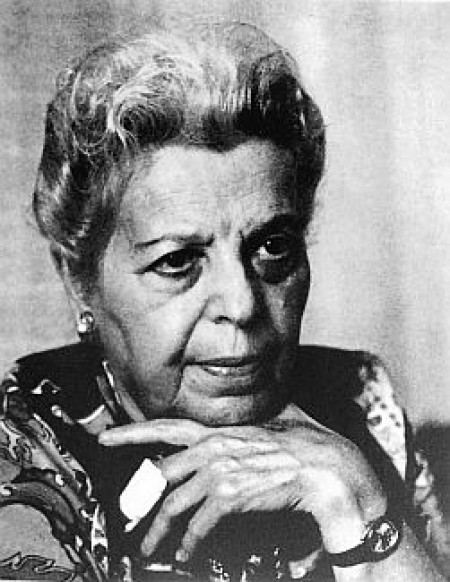
7 December 1898, Budapest – 7 May 1973, London
Ilonka Kabos, pianist and pedagogue was an outstanding pupil and representative of the so-called Szendy-school, who spent the majority of her life - from the end of the 1930s to her death in London, in 1973 – in England and the United States, enhancing the fame of the Academy of Music in Budapest.
Ilonka Kabos was born on December 7, 1898 in Budapest. She grew up in a literary atmosphere; his father Ede Kabos wrote plays and articles for the periodicals Pester Lloyd, the Magyar Nemzet and the National News of Kálmán Mikszáth, among others. The family had friendly ties to Endre Ady as well. Ady, who was amazed by the 10-11 years old girl, wrote a poem to her titled as Fehér lyány virág-kezei [Flower-Hands of a White Girl] which was published in the collection: Szeretném ha szeretnének [I want to be loved ] in 1909.
Two years later in the autumn of 1911 the talented pianist-candidate was already a student of the Liszt Academy of Music. She pursued her piano studies under the guidance of Árpád Szendy, a former disciple of Liszt, and broadened her knowledge of chamber music with Leó Weiner. After four years of study she earned her degree as a pianist, the program of her degree recital truly reflects the spirit of the school and the personality of the young performer: Bach–Liszt: Fantasy and Fugue in G minor, Brahms: Variations and Fugue on a Theme by Händel, Liszt: Sonetto del Petrarca, No. 104, Chopin: Scherzo in C sharp minor. Besides the degree, Kabos' talent and exceptional progress as a student were proven by the Liszt Ferenc-scholarship of the Capital, won in the same year.
She made her debut as a pianist in Budapest in 1916 and after the end of World War I abroad. She toured Western Europe as a soloist and chamber musician, as well, appeared in the Netherlands, Spain, Italy, Germany, France and England. The quality of her piano sound and the freshness of her playing were especially remarkable for her students and contemporaries. The core of her repertoire was comprised by 19th century works but she also programmed an emerging number of contemporary compositions from the 1920s. She frequently performed and later taught the works of Bartók, Kodály, Leó Weiner, Mátyás Seiber, Dallapiccola, Roy Harris and Chávez, gave premiere and international premiere of some of them. However, the most memorable were her interpretations of Romantic works; Pál Kadosa highlighted the sonatas of Brahms and Peter Frankl the works of Chopin while Aladár Tóth, the famous critic wished to hear the Sonata in B minor by Liszt whenever he visited Ilonka Kabos in London.
Her career as a pedagogue started at the Nemzeti Zenede [Music Secondary School] where she taught between 1931 and 1936. The faculty of the Institution consisted of such outstanding musicians as Anna Rosthy, János Ferencsik, János Hammerschlag, Lőrinc Kesztler and László Lajtha. In 1936, when she left, György Faragó was found as a fully appropriate successor of her.
Ilonka Kabos settled in London in 1938 where she soon became an acknowledged pianist and one of the legendary piano pedagogues of the post World War II generation, due to her sense for style, refined taste and juvenal, open minded personality. She led master classes in numerous cities of Western Europe and the United States, besides England. She was teaching five months each year at Julliard School, New York from 1965. John Ogdon, Shoura Cherkassky, Joseph Kalichstein were her students among others. Her house in England was a centre of musical life which served as a home for Hungarian emigrant musicians: her frequent guest was György Solti and the artistic careers of Tamás Vásáry and Peter Frankl started by her mentorship in London. According to Kodály she embodied the English-Hungarian musical friendship. On his visit to London in 1946, Ilonka Kabos premiered one of his newest pieces, the Gyermektáncok written exclusively for black keys, in the Hungarians' public society in Great Britain. The personality of Kabos unfolded the most fully at her activity as a pedagogue. She was a passionate pedagogue who inquired about Zoltán Kocsis and Dezső Ránki – whom just appeared at that time – from their master, Pál Kadosa on her last visit to Budapest, one year before her death. There was no time left for acquaintance, Ilonka Kabos died on May 27, 1973 in London.
K. A.


